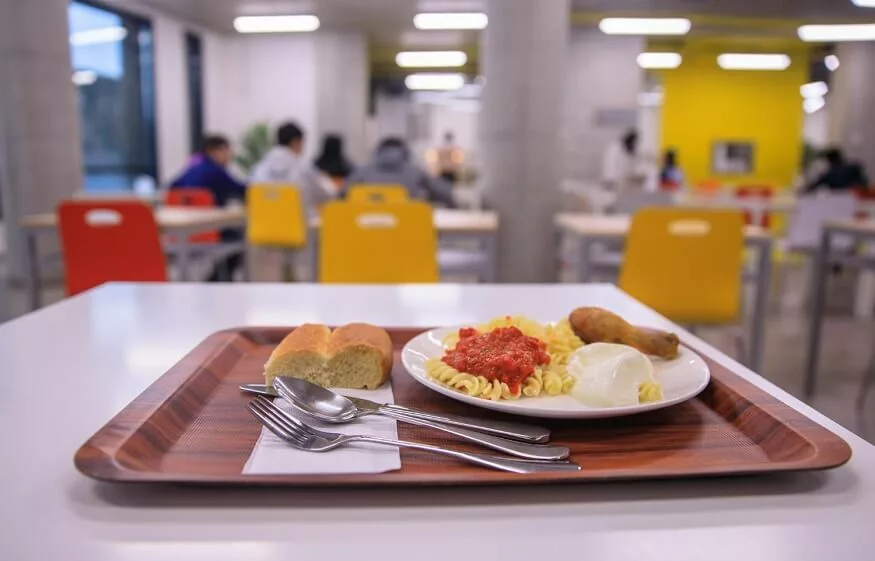The school cafeteria is not just a space for replenishing energy; it’s a microcosm of social interaction where students come together for nourishment and camaraderie. In this article of 10 essential school cafeteria etiquette rules, we’ll unravel the unspoken code that ensures a harmonious and enjoyable dining experience for every student.
Also Read: Moral Values for Students That Help Build a Good Character
Cafeteria etiquette for students
- Queueing with Grace: The cornerstone of cafeteria etiquette for students lies in mastering the art of queueing. Patience is not just a virtue; it’s a necessity when navigating the lunchtime rush. Queue-jumping disrupts the flow and can lead to unnecessary tension. A well-organised line ensures that everyone gets their fair share of time at the counter.
- Mindful Table Selection: Where you sit can significantly impact your lunchtime experience. It’s important to be considerate when choosing a table, especially in crowded cafeterias. Leaving spaces for others, avoiding occupied tables unless invited, and being mindful of designated areas (such as quiet zones or specific year groups) contribute to a more harmonious atmosphere.
- Tidiness Matters: A clean and tidy environment benefits everyone. Part of cafeteria etiquette involves cleaning up after oneself. Whether it’s disposing of waste properly or wiping down tables, taking a moment to leave your dining area as you found it contributes to a more pleasant environment for everyone.
- Volume Control: The cafeteria is a bustling place, but excessive noise can disrupt the peaceful coexistence of students trying to enjoy their meals. Being mindful of your volume when engaged in conversations and avoiding loud activities can create a more comfortable atmosphere for everyone.
- Respect for Personal Space: In the hustle and bustle of the lunch hour, it’s crucial to respect the personal space of others. Avoid crowding around tables or lingering too close to others while they eat. Everyone deserves a comfortable space to enjoy their meal without feeling cramped or invaded.
- Navigating Food Allergies and Preferences: In a diverse school community, understanding and respecting food allergies and dietary preferences is paramount. Cafeteria etiquette includes being considerate of those with specific dietary needs, refraining from making comments or jokes about someone’s food choices, and being open-minded about the diversity of food cultures within the school.
- Timely Lunch Purchases: Cafeterias often have limited serving times, and being mindful of these schedules is an important aspect of school cafeteria etiquette. Arriving too late may result in missing out on preferred meal options, causing unnecessary stress. Punctuality ensures that everyone has equal access to the available menu choices.
- Politeness with Cafeteria Staff: Behind every plate of food is a team of cafeteria staff working hard to provide nourishment for students. Demonstrating politeness, saying ‘please’ and ‘thank you,’ and treating cafeteria staff with respect fosters a positive relationship that benefits the entire school community.
- Technology Timeouts: While it might be tempting to scroll through social media or play games on your phone during lunch, practising digital etiquette is crucial. Engaging in face-to-face conversations rather than being glued to screens contributes to a more sociable and inclusive lunchtime experience.
- Mindful Departure: The end of lunchtime should be as thoughtful as the beginning. Cleaning up your area, returning trays and utensils to their designated places, and leaving the cafeteria in an orderly manner helps the staff maintain an efficient and clean space for the next wave of students.
In the intricate dance of school cafeteria life, etiquette is the music that guides every step. By embracing these 10 rules of school cafeteria etiquette, students can contribute to a more harmonious and enjoyable lunchtime experience for all. As we navigate the labyrinth of lunchtime choices and interactions, let respect, consideration, and camaraderie be our guiding principles.
Also Read: 25 Basic Etiquettes Every Child Should Learn
Importance of School Cafeteria Etiquette
Here are some key aspects highlighting the importance of school cafeteria etiquette:
Promotes Respect and Courtesy
Etiquette in the cafeteria is a manifestation of basic respect and courtesy. By waiting in line patiently, cleaning up after oneself, and being mindful of others, students learn the importance of treating their peers and the cafeteria staff with kindness and consideration.
Enhances Social Skills
The school cafeteria is a social hub where students from diverse backgrounds come together. Following etiquette rules encourages positive social interactions, helping students develop essential social skills such as communication, empathy, and cooperation. These skills are not only valuable in the school setting but also in future personal and professional contexts.
Creates a Positive Atmosphere
A well-maintained and orderly cafeteria contributes to a positive atmosphere within the school. When students follow etiquette rules, the cafeteria becomes a welcoming space where everyone feels comfortable, leading to a more pleasant overall school environment.
Fosters Inclusivity
Etiquette promotes inclusivity by ensuring that all students, regardless of their background or preferences, feel comfortable in the cafeteria. Respecting personal space, being considerate of dietary needs, and avoiding exclusionary behaviours contribute to a sense of belonging for every student.
Teaches Responsibility
Cleaning up after oneself and being mindful of the shared space instils a sense of responsibility in students. They learn that their actions have an impact on the collective well-being of the school community, fostering a sense of accountability for their surroundings.
Supports Time Management
Adhering to cafeteria schedules and being punctual for lunch helps students manage their time effectively. This skill is transferable to other aspects of their academic and personal lives, contributing to a disciplined and organised approach to daily activities.
Promotes Healthy Habits
Etiquette in the cafeteria extends to making healthy food choices and respecting individual dietary needs. By encouraging mindful eating and respecting diverse food preferences, students develop habits that contribute to their overall health and well-being.
Builds Positive Relationships with Staff
Interactions with cafeteria staff provide an opportunity for students to build positive relationships with the individuals who work hard to provide them with nourishing meals. Politeness, gratitude, and respect towards cafeteria staff create a harmonious and supportive school community.
Reduces Conflict and Tension
Following cafeteria etiquette minimises the likelihood of conflicts and tensions arising during lunchtime. Clear guidelines on queuing, table selection, and noise levels contribute to a smooth and stress-free dining experience for all students.
Prepares for Real-world Social Scenarios
Learning and practising etiquette in the school cafeteria prepares students for real-world social scenarios. The skills acquired in navigating shared spaces, respecting others, and displaying good manners are applicable in various social settings they will encounter throughout their lives.
Also Read: 10 Tips for Proper Classroom Etiquette
EuroSchool takes time and effort in teaching and reinforcing etiquettes for holistic development of students.










